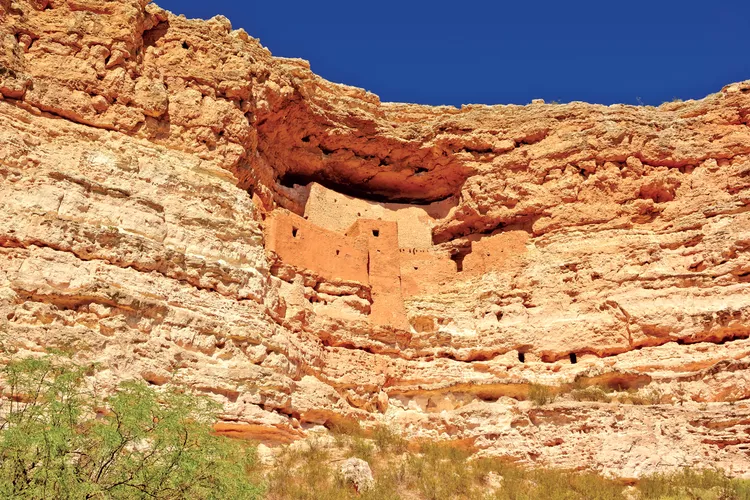Summary
Montezuma Castle National Monument
Located about one and a half hours north of Phoenix, Montezuma Castle National Monument is a must-see destination for history and nature enthusiasts. This monument is set against a sheer limestone cliff, approximately 100 feet above the Verde Valley in Camp Verde, Arizona. The ancient dwellings, constructed by the Sinagua people, date back between approximately 1100 AD and 1425 AD.
The main structure is an architectural marvel, comprising five stories and 20 rooms, totaling roughly 4,000 square feet of living space over three centuries. The dwellings were strategically positioned facing Beaver Creek, ensuring a steady water supply for agriculture, which included corn, beans, squash, and cotton. Furthermore, the elevated location provided protection from seasonal flooding and potential invaders.
Today, Montezuma Castle is recognized as one of the best-preserved ancient structures in North America. Though visitors cannot climb to the ruins, they can enjoy a 1/3-mile loop trail for photography and sightseeing. For an additional experience, the nearby Montezuma Well, a flooded limestone sinkhole, is just a short drive away, offering further insights into the agricultural practices of the era.
Montezuma Misnomer
The name “Montezuma Castle” is a historical misnomer. When early European-Americans discovered the ruins in the 1860s, they mistakenly attributed the site to the famed Aztec ruler, Montezuma. In reality, the dwelling was abandoned more than 40 years before Montezuma’s birth and served as a communal living space rather than a royal castle.
Tuzigoot National Monument
Another gem in the area, Tuzigoot National Monument, represents an ancient Sinagua village above the Verde Valley, constructed about 1,000 years ago. The name, derived from the Apache language meaning “crooked water,” is fitting for this two- to three-story pueblo ruin located on a limestone ridge east of Clarkdale, Arizona.
The Tuzigoot site includes 110 stone masonry rooms, reflecting a population that likely migrated from drought-affected regions. Visitors can explore the site to envision the daily life of the Sinagua culture, which involved farming, hunting, and crafting pottery. The interactive experience invites guests to immerse themselves in the historical setting.
Tips for Visitors
Both Montezuma Castle and Tuzigoot are managed by the National Park Service, providing informative resources. The museum at Montezuma Castle requires some renovations, while the Visitor Center at Tuzigoot is highly recommended for its quality exhibits. Tuzigoot is particularly favored by families as visitors can freely roam the structure, enhancing the overall experience.
Plan to spend several hours exploring the Tuzigoot pueblo and Tavasci Marsh, with a walking trail approximately 1/3-mile long. Engaging with park rangers offers valuable insights into the lives of the Sinagua people.
It is advisable to bring food and drinks, as neither monument offers dining options. A picnic area is available at Montezuma Castle. Additionally, if visiting during the warmer months, ensure you have hats and sunscreen due to limited shade.
Admission
There is an entrance fee for both Montezuma Castle and Tuzigoot. Check online for potential discounts for military personnel and seniors. Moreover, on select days throughout the year, visitors can access many of Arizona’s national parks and monuments free of charge.





